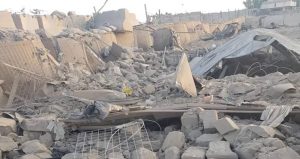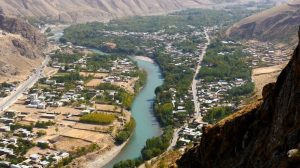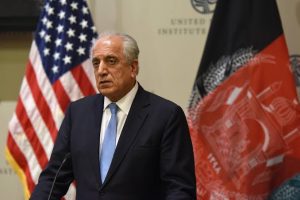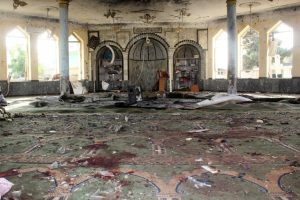Yemen Has The Right To Establish Political And Economic Relationships With Iran

MEP: Mohammed Tahir Anaam is a politician, religious scholar, founding member of Yemen’s first Salafi party (Al-Rashad) as well as its Supreme Committee member, Undersecretary of the Ministry of Education, and a former member of the National Dialogue Conference. Upon his return from a long trip in which he visited a number of countries including Russia and China, The Yemen Times sat with Anaam to ask about details of his journey, which he said it aimed to tell the truth about the ongoing war against Yemen.

Let’s start with your most recent activity. You briefly visited a number of states including Russia and China and held meetings with officials, clarifying the situation of Yemen for them. Could you please elaborate on those meetings?
I was a part of the Yemeni delegation that included five scholars. This delegation visited several countries including Russia and China. The trip lasted for two weeks and its purpose was explaining the war against Yemen and delivering the voice of Yemeni people to the Muslims living in those countries, showing them what the war has done to Yemen. Another objective was to explain the situation of Yemen to media outlets in those countries and hold press conferences attended by a large number of journalists. Those visits were very successful.
In August, we met with a number of Russian officials and religion scholars in Moscow, including the Deputy Minister of Foreign Affairs, Grand Mufti of Russia as well as other religious pundits. We explained for them the truth that there is no sectarian war in Yemen, but a political Saudi war against our country.
We had three press conferences and attempted to explain the situation in Yemen and the dangers of Saudi Arabia’s embrace of extremism and exporting it to Yemen, which could make Yemen a new home for ISIL once the extremist group is uprooted from Syria and Iraq. The world must stop the war in Yemen by all political means before it turns into a large ISIL exporter like Syria.
What did you notice about the war in Yemen when you visited foreign countries?
We received great understanding from the leaders and groups and established several channels of communication with them. However, we sadly discovered that there is a huge media blackout and misinformation directed against us by foreign media. The reason is that the impactful media in the region belong to Saudi and other Arab gulf states. Additionally, foreign correspondents are absent in Yemen and this could be due to their fear of the war, or being concerned for possible harassment by the warring parties. Anyhow, their absence impacted the foreign media and their understanding about the war on Yemen. That’s why they take their information from the Gulf States media.
We were surprised when we showcased the plight and suffering of Yemenis in some states and noticed that they almost have no idea about it. All they knew is that Saudi Arabia intervened in Yemen to save the Sunnis from being massacred by the Shiites like Iraq and that’s why Saudi Arabia intervened to save them. Thus, we clarified to them that the war is political and the Saudi media claims are not true, and we do not accept the Saudi intervention in our country.
Mr. Anaan, as a politician and a religion scholar, do you think that the 2-year-long war in Yemen is a political or a “sectarian” war as many are saying?
The war in Yemen is not a sectarian one, it was not and it will not be categorized as what is called “Sectarian War”. It is a foreign aggression led by Saudi Arabia which itself is trying to drag the Yemenis into sectarian wars.
The Gulf States media such as Wesal TV and other Saudi-owned channels are attempting to give the war a sectarian, territorial, south/north face. There is a methodological plan to spread these themes in order to extend the war for years, killing everyone and destroying Yemen.
“Saudi Arabia have pumped large sums of money and its TV channels are working to recruit a large number of Salafis and spread a propaganda saying that this is a sectarian war and there are Shiites who want to kill Salafis.”
This is a well-known plan; any colonizer who wants to destroy a country will use the Divide and Conquer method. Sadly, Yemenis are also to be blamed for playing into Saudi plans. But we appreciate our people who strongly stood up and refused this ideology, which is currently spread in cities such as Aden and Taiz under the control of the aggressors.
The aggression against Yemen is a barbaric one; indeed it is the most barbaric in the 21st century. We can see this savagery by looking at what is happening in the capital. Sana’a is the only capital in the world that has been without electricity for the past year and a half. This has not happen in any capital in the world, even in those countries engaging in wars for years. In addition, the assaulter party in this war has constantly targeted schools, wedding ceremonies, mosques, and even funerals. All these happened under a broad western alliance with the oil-rich Gulf States against Yemen.
Despite this 18-month-long suffering, the Yemeni people are still standing against them and refusing to bow to any foreign dominant power, either Saudi, Iranian, Qatari, or the West.
Who is targeting Yemen in this war?
Saudi Arabia started the aggression. Other countries in the so-called “coalition” are merely shy participants, except the UAE that has its own agenda in Yemen, especially in the South.
You’re saying that Saudi Arabia is fighting in Yemen, but what is its goal in doing so?
Saudi Arabia is trying to stop Yemen from becoming politically independent by saying it’s going to be under Iran’s control. Since long time ago, it has insisted that Yemen is politically and economically under Iran’s control. Saudi Arabia is spending dozens of billions of dollars on buying the sheikhs loyalties. I still remember their particular negative stance regarding the 1962 revolution. It [Saudi Arabia] refused the change and amassed mercenaries from all over the region and dragged Yemen into a civil war. This is a history repeating itself. But the resistance of the Yemeni people sends a message to Saudi Arabia that Yemen is free and will always have positive relationships with Iran, Saudi Arabia, Egypt and all other countries based on goodwill and equality.
Saudi Arabia claims there is an Iranian presence in Yemen, how do you respond to that?
With regards to Iran, it is the right of Yemenis to establish a relationship with Iran similar to their relationship with Saudi Arabia and any other states. We are not part of the Saudi-Iranian disagreements, and if there is any disagreement between them, they must resolve it away from Yemen.
We do not accept severing ties with Iran, which has the right to establish economic projects in Yemen, and we have the right to establish an economic, military, athletic or political cooperation. Similar to those ties with Saudi Arabia.
But Saudi Arabia is the protector of the Two Holy Mosques, it is trying to protect religion in Yemen as it is claiming.
This is the use of religion to achieve political gains. Unfortunately, since hundred years ago and until today the Saudi regime is fully dependent on using religion for political purposes and as a pretext to fight any country that would not give in to them.
As an academic professional I was studying the Saudi history, Saudi Arabia has always used religion in all its wars since the days of sheikh Mohammed Abdul Wahab Al-Najdi. It is known for its hostility against all neighboring countries.
The Houthis are claiming that there is a powerful party “the US” supporting Saudi Arabia in its war against Yemen; do you agree with the Houthis?
In my view, the main enemy of Yemen is Saudi Arabia. This animosity is larger than the US animosity towards Yemen. Ansarullah’s slogan should be directed against it [Saudi Arabia] and not against America. This does not mean that we should ignore the American role in participating in the war, indirectly. Americans should be held responsible for all the [Saudi] crimes for providing the cover to the Saudis for killing us.
Does that mean that you’re against the Houthi slogan, which is against the US?
I am not against it; the slogan addresses the root of the aggression that are American and British. In my view animosity and the slogan should be directed against Saudi Arabia, it is the criminal and the thug that does the bidding of these countries.
It appears to me that Ansarullah have a specific goal by focusing their slogan against the US. They consider Saudi Arabia a tool used by the US, and that Saudi Arabia and the Saudis are Muslims. While the real animosity in the holy Quran is against Ahel Al-Kitab [Christians and Jews] who are represented in this age by the US. Instead of pushing us to antagonize the Muslims who are being used as a tool, we push them [the Houthis] towards antagonizing the US by using this slogan.
Even Iran, its slogan is against the US, because the Iranian mindset is not for mobilizing against Saudi Arabia and other Muslims, but rather for mobilizing against the US. This is an Islamic viewpoint that we respect, it is based on Quranic principles.
As a religion scholar connected with Al-Rashad Salafi Party, can you explain what’s the Salafis’ view regarding the war in Yemen?
We the Salafis of Yemen are against the aggression, we have held a conference in April of last year for the Sunni Scholars. It was in Hodeida province and included 400 only-Sunni scholars and was called “Conference of Sunni Scholars”. We issued a statement, rejecting the Saudi intervention in Yemen and all 400 scholars signed that statement. I would like to correct a misinformation about the war in Yemen and clarify for the world that it is not a sectarian war between Sunnis and Shiites.
Does your opinion represent all Salafis or are there also some divisions?
There are divisions amongst Salafis regarding the Saudi Aggression. Saudi Arabia have pumped large sums of money and its TV channels are working to recruit a large number of Salafis and spread a propaganda saying that this is a sectarian war and there are Shiites who want to kill Salafis. This has caused misguided religion-based claims and some members in Al-Rashad party believed it. But there is also a large part of the party that refused the misleading propaganda and refused to be dragged into it.
Are there any plans to drag Al-Rashad Party in particular and the Salafis of Yemen in general into the violence?
Yes, by Saudi Arabia and other countries. There was some rushing and misunderstanding by Ansarullah but it was all cleared up. The Salafi prisoners were released from Ansarullah’s prisons.
Sadly, there are Salafis who have been deceived by the Saudi propaganda into believing that they are fighting Magi and Rejectionists [Ansarullah] who distorted the Holy Quran. Some Salafis were tricked by wrong information, which is happening in Aden and Taiz. But in Sana’a and the north we find them more comfortable with the Houthis.
Leaders from Al-Rashad Party are in Riyadh siding with Hadi, what is the Party’s stance on the 2-year-long war?
“I am a Salafi, I have no sectarian or doctrinal problems with Saudi Arabia, my patriotism made me against the Saudi regime.”
Al-Rashad is a Yemeni National Party that cannot endorse a foreign aggression against our country. Those party leaders, who went to Riyadh, have violated the principle rules of Al-Rashad Party and were tempted by money, their own greed and ambitions of authority when they took these dangerous decisions.
We are still attaching to our values and bylaws. Al-Rashad Party is a Yemeni party that refuses the destruction of the country and refuses the aggression. As the deputy chief of Al-Rashad party’s Shura Council, a member in its Supreme Committee, a founding member of the party, and former representative of the party in the National Dialogue Conference, I confirm that those behaviors; supporting the aggression, are against the party’s principles and bylaws.
Why is not a new head of the party elected instead of Al-Aamri who is for Saudi Arabia’s war on Yemen?
Change is difficult currently because the political process is halted due to the current events. The Parties Affairs Committee was unresponsive. There is a kind of delay, and the party is infiltrated by Saudi money which was distributed to some members in the party’s Supreme Committee in order to please the aggression countries.
I am currently a member in the Political Parties Congregation that rejects the aggression as a representative of Al-Rashad Party. We have issued a number of statements and I have signed them with my highest capacity in the party.
You have always attacked Saudi Arabia in your statements to the media and your posts on social media, is there an old feud between you and the Saudis or is it just because of the war?
There are no sectarian or racial problems between Saudi Arabia and us. The only problem is the aggression, as soon as that ends and the rebuilding begins, relationships will be back to normal. As for me attacking Saudi Arabia, it comes from defending our country and people, who were made hungry and homeless by the Saudi regime. I am a Salafi, I have no sectarian or doctrinal problems with Saudi Arabia, my patriotism made me against the Saudi regime.
I was born in Saudi Arabia and my basic education was in their schools. Therefore, my position regarding the kingdom is based on my personal experience and knowledge about their actions against us.
Have you been harassed by any member of the party due to your position on Saudi Arabia?
What bothers me is the fact that there are some members of the party who try to fire me, illegally. In addition to that, they are impeding our work by preventing our voices to be heard, either through temptation or intimidation. We just prefer that our positions be in the best interest of our country and people.
From your own political and religious view, how do you see the future of the war in Yemen? And what does it take to end it?
There are four powers in Yemen; The General People’s Congress, The Houthis, The Islah Party, and The Southern Movement. If these stakeholders get united in favor of the country, they will mobilize thousands of people to end the war on Yemen, and none of these stakeholders can be excluded from the rule.
The only solution to end the war is to make a roadmap in which all the four sides participate and create a national salvation government. Then 90 percent of the fighting will stop. This can only be achieved if Saudi Arabia stops its intervention in Yemen, and Hadi and his government are forgotten.





